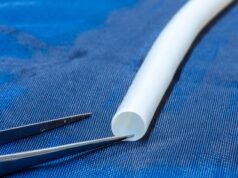 Fresenius Medical Care, the world’s largest provider of dialysis products and services, and Humacyte, Inc., a medical research, discovery and development company, have announced a strategic, global partnership and a US$150 million equity investment. This agreement has the potential to make Humacyte’s investigational human acellular vessel, HUMACYL, available to more patients worldwide following approval of the product. HUMACYL is currently being investigated for vascular access for haemodialysis and may prove more effective than current synthetic grafts and fistula. Under the terms of the agreement, Fresenius Medical Care will obtain the exclusive global rights to commercialise HUMACYL.
Fresenius Medical Care, the world’s largest provider of dialysis products and services, and Humacyte, Inc., a medical research, discovery and development company, have announced a strategic, global partnership and a US$150 million equity investment. This agreement has the potential to make Humacyte’s investigational human acellular vessel, HUMACYL, available to more patients worldwide following approval of the product. HUMACYL is currently being investigated for vascular access for haemodialysis and may prove more effective than current synthetic grafts and fistula. Under the terms of the agreement, Fresenius Medical Care will obtain the exclusive global rights to commercialise HUMACYL.
“By partnering with Humacyte, Fresenius Medical Care has an opportunity to offer a dialysis vascular access option with the potential for significant clinical efficacy and safety improvements, including the potential to minimise catheter contact time to the benefit of our patients,” says Franklin Maddux, chief medical officer for Fresenius Medical Care North America. “Our exclusive rights to distribute this innovative technology to dialysis patients worldwide may have significant benefits not only to patients, but health systems as well. With the potential for fewer anticipated complications and interventions compared to synthetic grafts, we may see increased safety for patients and reduced medical and economic burdens to the healthcare system.”
The current vascular access modalities necessary to deliver dialysis treatment include fistulae, grafts and central venous catheters. All three options have limitations. Half of fistulae fail and do not mature in patients, delaying vascular access for dialysis treatment. In the meantime, many patients need a central venous catheter, which significantly increases the risk of infection. Humacyte has developed a novel human tissue-based investigational product, HUMACYL, for patients with end-stage renal disease requiring haemodialysis. Compared to an arteriovenous fistula, the product can be available for use in haemodialysis within weeks and may have an overall higher rate of maturation. It also may offer a more durable, biologic alternative to synthetic grafts.
“This is a transformational milestone for Humacyte, giving us the world’s strongest partner to help bring our product to more patients globally,” says Carrie Cox, CEO and chairman of Humacyte. “Our partnership will allow Humacyte to focus on advancing the potential for HUMACYL as a substantial breakthrough in the science of regenerative medicine, and to continue our development of an exciting future pipeline.”
Humacyte’s bioengineered blood vessel is currently in Phase III pivotal trials in the USA and Europe, and the company plans to seek regulatory approval in both regions upon completion of the trials.











